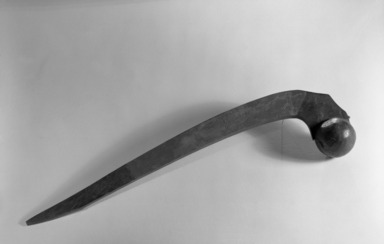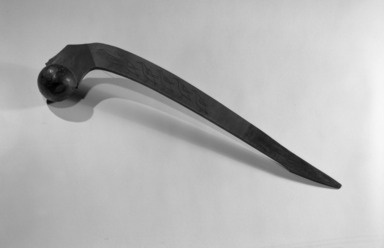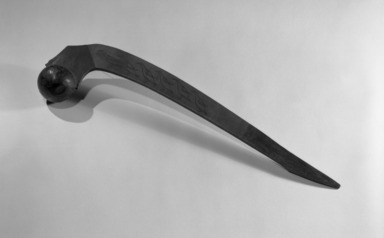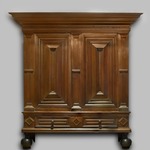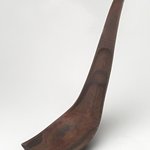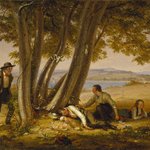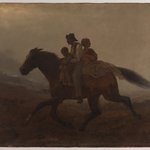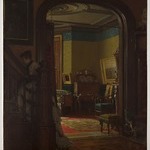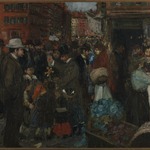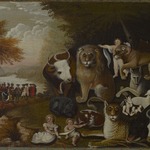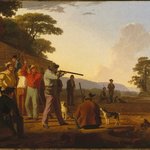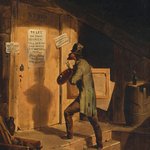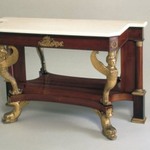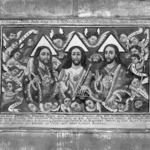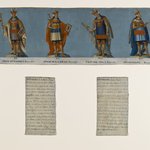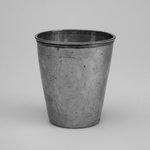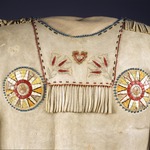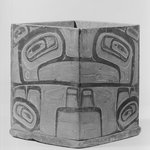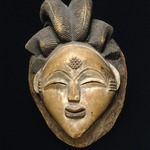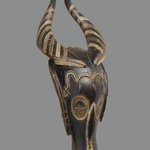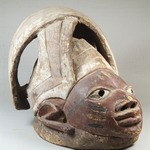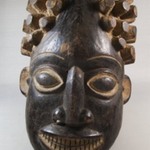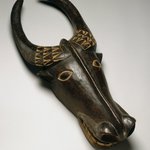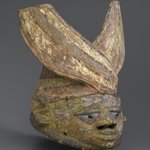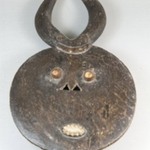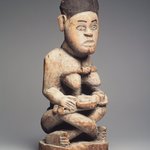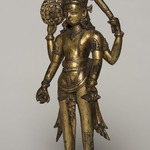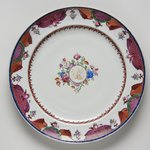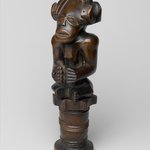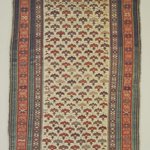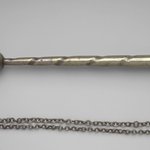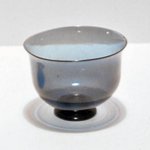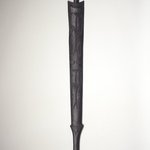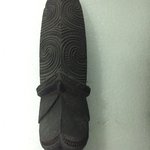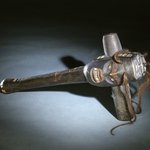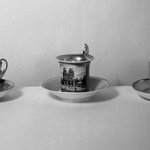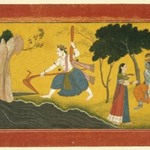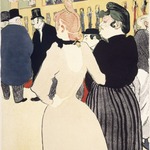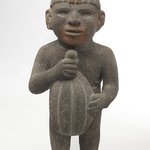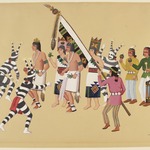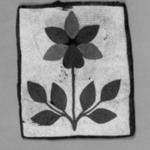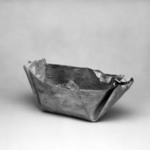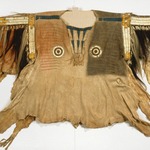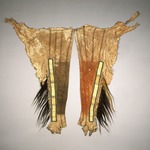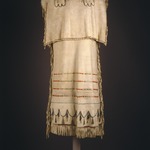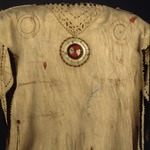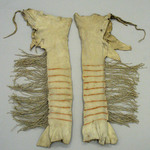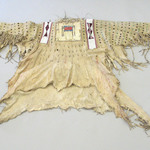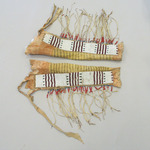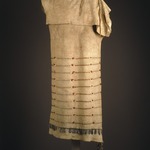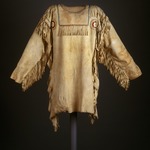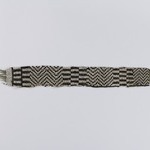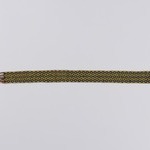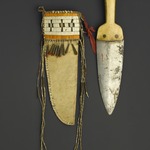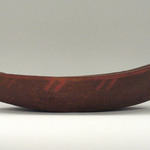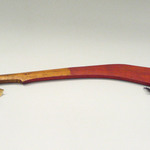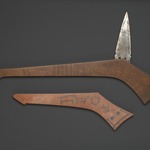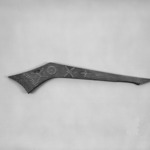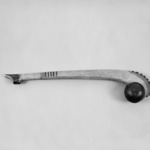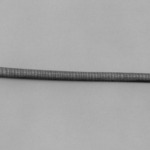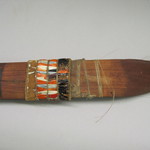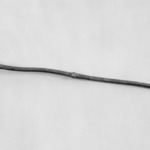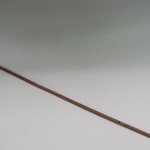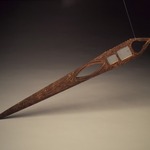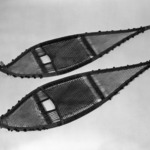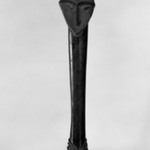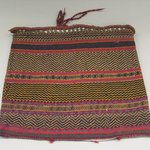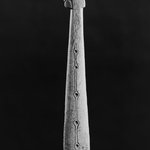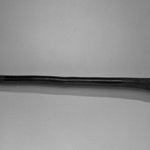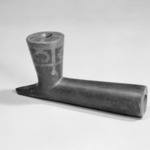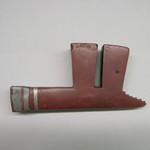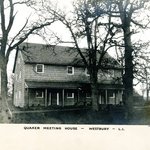Ball-headed War Club with Carvings of Birds and Men
Arts of the Americas
The Jarvis Collection of Native American Plains Art
The articles in this case and the adjacent clothing case are some of the earliest and finest Eastern Plains pieces in existence. They were collected by Dr. Nathan Sturges Jarvis, a military surgeon stationed at Fort Snelling, Minnesota, between 1833 and 1836. He purchased some of the objects, while some may have been given in exchange for his medical services. These works display indigenous people’s ingenuity in combining trade materials such as cloth, metal, and glass beads with traditional hides, red pipestone, and porcupine and bird quills.
MEDIUM
Wood, pigment
DATES
early 19th century
DIMENSIONS
22 1/2 x 6 x 3 in. (57.2 x 15.2 x 7.6 cm)
(show scale)
ACCESSION NUMBER
50.67.84
CREDIT LINE
Henry L. Batterman Fund and the Frank Sherman Benson Fund
PROVENANCE
Prior to 1848, provenance not yet documented; by 1848, acquired by Nathan Sturges Jarvis; 1848, gift of Nathan Sturges Jarvis to the New-York Historical Society, New York, NY; 1937, loaned by the New-York Historical Society to the Brooklyn Museum; 1950, purchased from the New-York Historical Society by the Brooklyn Museum.
Provenance FAQ
CATALOGUE DESCRIPTION
Ball-headed war club with incised designs on the handle including six birds on one side and four (possibly) dancing or fighting figures on the other. The bird motifs are filled with black paint, the figures with red paint. The ball is painted black and there is fire decoration on the handle.
The painted and incised designs on this club consist of six black gallinaceous birds (prairie chicken-like in silhouette) on one side. On the opposite side, two pairs of red human figures run toward one another. Each of the four carries a pipe in one hand and, in the other, an upraised arrow in an enigmatic pose.
As demonstrated in this example, clubs were carved from one piece of wood. Often a thick branch attached to a trunk was chosen, or a knot of a tree would be formed into a head and the attached portion of the trunk into a handle, so that the grain had structural strength. The club is flat handled and sided and stained black at both the handle end and ball end.
MUSEUM LOCATION
This item is not on view
CAPTION
Chippewa (Anishinaabe). Ball-headed War Club with Carvings of Birds and Men, early 19th century. Wood, pigment, 22 1/2 x 6 x 3 in. (57.2 x 15.2 x 7.6 cm). Brooklyn Museum, Henry L. Batterman Fund and the Frank Sherman Benson Fund, 50.67.84. Creative Commons-BY (Photo: Brooklyn Museum, 50.67.84_acetate_bw.jpg)
IMAGE
overall, 50.67.84_acetate_bw.jpg. Brooklyn Museum photograph
"CUR" at the beginning of an image file name means that the image was created by a curatorial staff member. These study images may be digital point-and-shoot photographs, when we don\'t yet have high-quality studio photography, or they may be scans of older negatives, slides, or photographic prints, providing historical documentation of the object.
RIGHTS STATEMENT
Creative Commons-BY
You may download and use Brooklyn Museum images of this three-dimensional work in accordance with a
Creative Commons license. Fair use, as understood under the United States Copyright Act, may also apply.
Please include caption information from this page and credit the Brooklyn Museum. If you need a high resolution file, please fill out our online
application form (charges apply).
For further information about copyright, we recommend resources at the
United States Library of Congress,
Cornell University,
Copyright and Cultural Institutions: Guidelines for U.S. Libraries, Archives, and Museums, and
Copyright Watch.
For more information about the Museum's rights project, including how rights types are assigned, please see our
blog posts on copyright.
If you have any information regarding this work and rights to it, please contact
copyright@brooklynmuseum.org.
RECORD COMPLETENESS
Not every record you will find here is complete. More information is available for some works than for others, and some entries have been updated more recently. Records are frequently reviewed and revised, and
we welcome any additional information you might have.
Do you know what this was used for?
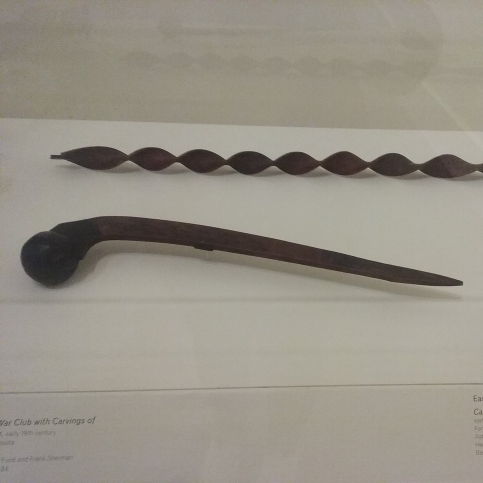
The spiral-shaped object is a pipe stem by an Eastern Sioux artist. It would have been part of the ceremonial equipment used in tobacco smoking.
What about the club?
It is a Ball-headed War Club by a Chippewa (Ojibwe) artist. These clubs, and those of similar design, were used throughout the Great Lakes region. If you look closely, there are birds and men carved onto the surface.
The
club was a weapon but it could also have been carried during ceremonies as a status
object indicating that the man was a great warrior.
